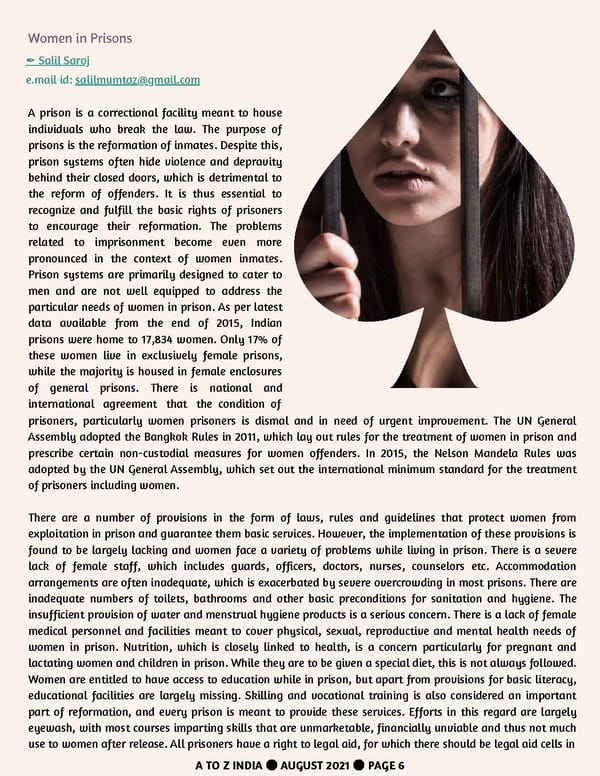Women in Prisons ✒ Salil Saroj e.mail id: [email protected] A prison is a correctional facility meant to house individuals who break the law. The purpose of prisons is the reformation of inmates. Despite this, prison systems often hide violence and depravity behind their closed doors, which is detrimental to the reform of offenders. It is thus essential to recognize and fulfill the basic rights of prisoners to encourage their reformation. The problems related to imprisonment become even more pronounced in the context of women inmates. Prison systems are primarily designed to cater to men and are not well equipped to address the particular needs of women in prison. As per latest data available from the end of 2015, Indian prisons were home to 17,834 women. Only 17% of these women live in exclusively female prisons, while the majority is housed in female enclosures of general prisons. There is national and international agreement that the condition of prisoners, particularly women prisoners is dismal and in need of urgent improvement. The UN General Assembly adopted the Bangkok Rules in 2011, which lay out rules for the treatment of women in prison and prescribe certain non-custodial measures for women offenders. In 2015, the Nelson Mandela Rules was adopted by the UN General Assembly, which set out the international minimum standard for the treatment of prisoners including women. There are a number of provisions in the form of laws, rules and guidelines that protect women from exploitation in prison and guarantee them basic services. However, the implementation of these provisions is found to be largely lacking and women face a variety of problems while living in prison. There is a severe lack of female staff, which includes guards, officers, doctors, nurses, counselors etc. Accommodation arrangements are often inadequate, which is exacerbated by severe overcrowding in most prisons. There are inadequate numbers of toilets, bathrooms and other basic preconditions for sanitation and hygiene. The insufficient provision of water and menstrual hygiene products is a serious concern. There is a lack of female medical personnel and facilities meant to cover physical, sexual, reproductive and mental health needs of women in prison. Nutrition, which is closely linked to health, is a concern particularly for pregnant and lactating women and children in prison. While they are to be given a special diet, this is not always followed. Women are entitled to have access to education while in prison, but apart from provisions for basic literacy, educational facilities are largely missing. Skilling and vocational training is also considered an important part of reformation, and every prison is meant to provide these services. Efforts in this regard are largely eyewash, with most courses imparting skills that are unmarketable, financially unviable and thus not much use to women after release. All prisoners have a right to legal aid, for which there should be legal aid cells in A TO Z INDIA ● AUGUST 2021 ● PAGE 6
 A TO Z INDIA - AUGUST 21 Page 5 Page 7
A TO Z INDIA - AUGUST 21 Page 5 Page 7